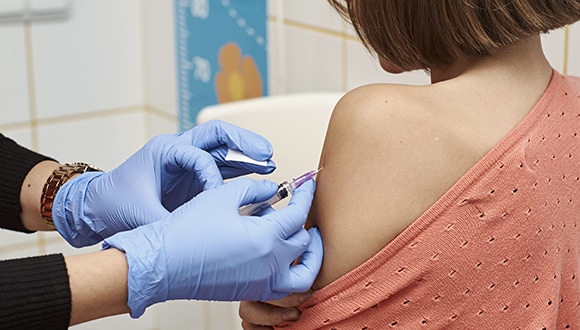Worried about the measles outbreak? Here’s how to protect yourself
It’s on the rise in Australia and around the world but getting vaccinated is still the best form of defence against the measles outbreak.
Angela Tufvesson
Novl 2019
The number of measles cases in Australia and around the world has risen significantly in recent years. At the end of October 2019, 235 Australians have been diagnosed with measles, and according to the Australian Government’s Department of Health we’re on track to record the second-highest number of annual cases since 1997. What’s more, the disease has seen a 30% increase in cases globally according to the World Health Organization (WHO).
Health authorities say measles is a serious infectious disease that can result in complications and even death. In 2017, there were 110,000 people who died from measles worldwide. Thankfully, there’s an easy and effective way to protect yourself and the people around you: vaccination.

How dangerous is measles?
The first symptom in a case of measles is usually a high fever. After several days, the characteristic rash often starts on the face or around the hairline and spreads to the whole body. But it’s the complications associated with the disease, rather than the disease itself, that can be serious and life-threatening. These complications include ear infections, pneumonia, blindness and encephalitis – swelling of the brain.
And here’s the headline: measles is very contagious. So contagious that up to 90% of non-immune people in close contact with an infected person who has a confirmed case of measles will also become infected, according to the Centers for Disease Control and Prevention.
“Measles is spread through coughing and sneezing, and the virus can live for a couple of hours on an object like a door handle,” says Associate Professor Mark Morgan from the Royal Australian College of General Practitioners. “It's one of those illnesses that once it gets into a community or environment, will spread quickly to anybody that's susceptible.”
Why are measles cases on the rise?
Australia eliminated measles in 2014, which means the disease is no longer passed from person to person within our borders. This is thanks to ‘herd immunity’, which occurs when enough of the population has been vaccinated against measles.
But we are a nation of avid travellers and because highly infectious measles is on the rise globally, some people contract the disease overseas, says Professor Kristine Macartney, director of the National Centre for Immunisation Research and Surveillance.
“Sporadic outbreaks of measles occur due to the importation of the virus into Australia via visitors from overseas or Australians returning from overseas,” she says. “Outbreaks of measles occur in other parts of the world due to falls in vaccine coverage, as well as weaker health systems.”
Measles remains a common disease in parts of Asia, the Pacific (discounting Australia), Africa, and even Europe, where 41,000 cases were reported in the first half of 2018. In New Zealand, 1,742 people have been diagnosed with the disease so far this year.
How do travellers get the measles?
Some people got only one measles vaccination instead of the recommended two, which offers 99% protection instead of 96%. The two-dose program was introduced by the health department in 1992 and Australians born between 1966-1994 are most likely to have had only one dose of the vaccine.
Other people shun measles vaccinations for a variety of reasons. There are small pockets of areas in almost all Australian states and territories where less than 85% of two-year-olds have been vaccinated, says the National Centre for Immunisation Research and Surveillance. Assoc Prof Morgan says these trends can threaten our strong herd immunity.
“In these pockets, immunisation rates are not reaching the level that is needed to stop measles from spreading around the community,” he says. “As soon as immunisation rates drop below about 95% of the population, there's an increased risk of a measles outbreak.”
Vaccination: The simple solution
There is no specific treatment for measles and the World Health Organization (WHO) says vaccination is the best form of defence. The measles vaccine has been in use for more than 50 years, and according to the WHO, it’s safe, effective and one of the key public health measures to reduce measles deaths. In fact, before the vaccination became widespread in 1980, measles caused an estimated 2.6 million deaths around the world each year.
“Vaccination is one of the easiest ways to help protect yourself and your family against measles,” says Prof Macartney.
What’s more, Assoc Prof Morgan says protecting yourself helps to protect vulnerable members of our community through essential communicable disease control.
“Very young babies get a bit of immunity directly from their mother, but there’s a gap and that immunity drops off because we can’t give the routine immunisation until they’re one year old,” he says. “In that gap between when babies stop being protected by immunity from pregnant women and haven't started being protected by the vaccine, they're at risk.”
Australia’s children’s vaccination program includes a second measles vaccination at 18 months as part of the MMRV vaccine that also protects against mumps and rubella. If you haven’t been vaccinated or you’re unsure if you received a second vaccination in childhood, see your GP. It’s safe for adults to have an extra vaccine if you’re unsure.
Related articles
THE ANTI-VACCINATION MOVEMENT: MYTHS VS FACTS
It’s a divisive, and emotive, topic. We track the history of the anti-vaccination movement and the potential consequences of under-vaccination.
CHILDHOOD VACCINATION: THE FACTS
What you need to do to keep your child on track with the vaccination schedule, and the truth about vaccination side effects.
TESTS IN PREGNANCY: WHAT TO EXPECT
This guide will help you understand what to expect with each medical test in pregnancy, when you’ll be tested and how to prepare.
5 PREVENTABLE HEALTH ISSUES
You can improve your quality of life every day through healthy eating, exercise and vaccinations. Here are 5 preventable health issues you can address today.